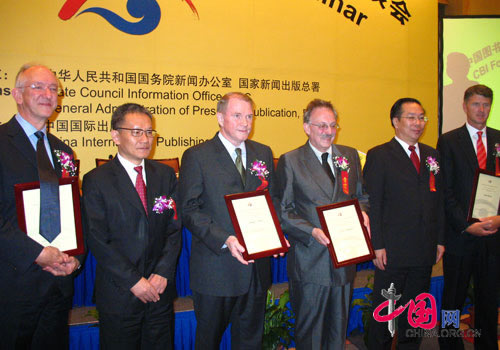Nine professionals from publishing houses and organizations around the world gave speeches to a group of consultants from the China Book International (CBI) project about how to internationally promote books on China, a day before the 16th Beijing International Book Fair (BIBC) opens.
|

|
|
Four new consultants of CBI: Stephen Bourne, CEO of Cambridge University Press (first from left); Ronald G. Dunn, president and CEO of Cengage Learning (third from left); Andrew Jonathan Maclean Wheatcroft, professor of the International Publishing and Communication Department and director of the Centre for Publishing Studies at the University of Stirling (third from right); and Brian Murray, president and CEO of HarperCollins Publishers Worldwide (first from right). [China.org.cn] |
The publishers shared their views about the opportunities and challenges of publishing and promoting China-themed books internationally, including both specific and general marketing perspectives. According to Elizabeth Knup from the Penguin Group, China "is rarely out of the newspaper headlines and publishing lists reflect this increased relevance. Books written in English on China-related themes form an important part of new title lists, especially non-fiction."
Claudia Kaiser, vice president of the business development department at the Frankfurt Book Fair, said the topics that interest foreign readership cover a wide range. In Germany, for example, people are interested in Chinese literature, art, culture, history, economics, politics, travel and coffee table books.
However, books on China still face a lot of challenges, such as cultural barriers, a competitive English book market and different ways of doing business. Finding qualified translators who are native English speakers, as well as a lack of popularity for Chinese authors among western readers are other hurdles that must be jumped.
Professor Paul Richardson, an international publishing consultant and chairman of China Publishing Ltd, suggested Chinese publishers and authors first grasp more knowledge about foreign markets, including details. Richardson said different publishers and books need to apply different methods of market entry. For books aiming at mass markets, such as fiction, the best way is still to license rights. For specialist books, such as Chinese language learning books, joint ventures may be the most effective way. A still bolder approach is to follow China Youth Publishing House's steps, which opened an office in the target market. This move might lose money initially, but will help build brand in the long run.
The CBI project was initiated by the State Council Information Office and General Administration of Press and Publication in 2006. The project funds organizations all around the world to publish books on China. To date, a total of 156 publishing houses in 36 countries have joined the project, publishing 1,318 books in 21 languages.
The 16th Beijing International Book Fair (BIBC) opens September 3 at the China International Exhibition Center. It will last four days. About 1600 publishing houses from 56 countries and regions are expected to attend.
(China.org.cn by Ren Zhongxi, September 3, 2009)